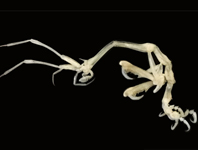Abstract
A new genus and species of pygmy grasshopper (Orthoptera: Tetrigidae) is described from Eocene Baltic amber. Danatettix hoffeinsorum gen. et sp. nov. is assigned to the subfamily Batrachideinae based on antennae with more than 19 antennomeres, sulcate mesofemora, and rectangular paranota. This species is readily distinguished from other batrachideines by a markedly produced vertex, pronotum with divergent internal and external lateral carinae, and highly setiferous female lateral basivalvular sclerite with scabrose integument. The morphology of Danatettix suggests placement within the here defined Tettigidea genus group (comprising Eutettigidea Hancock, 1914, Paurotarsus Hancock, 1900, and Tettigidea Scudder, 1862) and suggests that the latter had diverged from the new Scaria genus group (comprising Eotetrix Gorochov, 2012, Rehnidium Grant, 1956 and Scaria Bolívar, 1887) by the Early Eocene.
References
Ander, K.L. (1936) Orthoptera Saltatorias fylogenipå grundval av jämforande automiska studier. Opuscula Entomologica, 1, 93–94.
Azar, D. & Nel, A. (2008) First Baltic amber megapodagrionid damselfly (Odonata: Zygoptera). Annales de la Société Entomologique de France, New Series, 44 (4), 451–457.
https://doi.org/10.1080/00379271.2008.10697580
Bolívar, I. (1887) Essai sur les Acridiens de la tribu des Tettigidae. Annales de la Société Entomologique de Belgique, 31, 175–313, pls. 4–5.
Cigliano, M.M., Braun, H., Eades, D.C. & Otte, D. (2019) Orthoptera Species File. Version 5.0/5.0. Available from: http://Orthoptera.SpeciesFile.org (accessed 28 April 2019)
Devriese, H. (1996) Bijdrage tot de systematiek, morfologie en biologie van de West-Palearktische Tetrigidae. Nieuwsbrief / Lettre de contact Saltabel, 15, 2–38.
Dlussky, G.M. & Dubovikoff, D.A. (2013) Yantaromyrmex gen. n.—a new ant genus (Hymenoptera Formicidae) from Late Eocene ambers of Europe. Caucasian Entomological Bulletin, 9, 305–314.
https://doi.org/10.23885/1814-3326-2013-9-2-305-314
Figueirido, B., Janis, C.M., Pérez-Claros, J.A., de Renzi, M. & Palmqvist, P. (2012) Cenozoic climate change influences mammalian evolutionary dynamics. Proceedings of the National Academy of Sciences, 109, 722–727.
https://doi.org/10.1073/pnas.1110246108
Gorochov, A.V. (1989) A new representative of the family Rhaphidophoridae (Orthoptera) from Baltic amber. Paleontologicheskii Zhurnal, 3, 108–110.
Gorochov, A.V. & Labandeira, C.C. (2012) Eocene Orthoptera from the Green River Formation of Wyoming (USA). Russian Entomological Journal, 21, 357–370.
https://doi.org/10.15298/rusentj.21.4.02
Grant, H.J.Jr. (1956a) The taxonomy of Batrachidea, Puiggaria, Lophoscirtus, Eutettigidea and Rehnidium n. gen. (Orthoptera: Acridoidea, Tetrigidae). Transactions of the American Entomological Society, 82, 67–108.
Grant, H.J.Jr. (1956b) The African Tetrigid genera Phloeonotus and Ascetotettix n.gen. (Orthopera: Acrididae). Notulae Naturae, 293, 1–14.
Grant, H.J.Jr. (1962) A revision of the subfamily Batrachideinae (Orthoptera; Tetrigidae). PhD Thesis, University of Colorado, University of Colorado Library, Colorado, 208 pp.
Grant, H.J.Jr. (1966) The Pacific genera of the subfamily Batrachideinae (Orthoptera:Tetrigidae). Pacific Insects, 8 (4), 579–601.
Hancock, J.L. (1900) A new Tettigian genus and species from South America. Psyche, a Journal of Entomology, 9 (288), 42–43.
https://doi.org/10.1155/1900/31462
Hancock, J.L. (1914) Some corrections in names of South American Tetriginae. Entomological News, 25, 328. Available from: https://biodiversitylibrary.org/page/26383716 (Accessed 15 Oct. 2019)
Heads, S.W. (2009) New pygmy grasshoppers in Miocene amber from the Dominican Republic (Orthoptera: Tetrigidae). Denisia, 26 (Neue Serie), 86, 69–74.
Heads, S.W., Thomas, M.J. & Wang, Y. (2014) A remarkable new pygmy grasshopper (Orthoptera, Tetrigidae) in Miocene amber from the Dominican Republic. ZooKeys, 429, 87–100.
https://doi.org/10.3897/zookeys.429.8020
Heer, O. (1865) Die Urwelt der Schweiz. Schulthess, Zurich, xix + 622 pp.
Heinrichs, J., Hedenäs, L., Schäfer-Verwimp, A., Feldberg, K. & Schmidt, A.R. (2014) An in situ preserved moss community in Eocene Baltic amber. Review of Palaeobotany and Palynology, 210, 113–118.
https://doi.org/10.1016/j.revpalbo.2014.08.005
Heinrichs, J., Schmidt, A.R., Schäfer-Verwimp, A., Gröhn, C. & Renner, M.A.M. (2015) The leafy liverwort Notoscyphus balticus sp. nov. (Jungermanniales) in Eocene Baltic amber. Review of Palaeobotany and Palynology, 217, 39–44.
https://doi.org/10.1016/j.revpalbo.2015.02.006
Hoffeins, C. (2012) On Baltic amber inclusions treated in an autoclave. Polskie Pismo Entomologiczne, 81, 165–181.
https://doi.org/10.2478/v10200-012-0005-z
Hoffeins, H.W. (2001) On the preparation and conservation of amber inclusions in artificial resin. Polskie Pismo Entomologiczne, 70, 215–219.
Kuřavová, K., Šipoš, J., Wahab, Rodzaj. A., Kahar, R.S. & Kočárek, P. (2016) Feeding patterns in tropical groundhoppers (Tetrigidae): a case of phylogenetic dietary conservatism in a basal group of Caelifera. Zoological Journal of the Linnean Society, 2016, 1–12.
https://doi.org/10.1111/zoj.12474
Olivier, G.A. (1789) Encyclopédie méthodique. Dictionnaire des insects. Vol. 4. Pankouke, Paris, 331 pp.
Piton, L. (1938) Succinotettix chopardi Piton, orthoptère (Tetricinae) inédit de l’ambre de la Baltique. Bulletin de la Société Entomologique de France, 43, 226–227.
Rambur, P. (1838) Orthoptères. Faune entomologique de l’Andalousie. Libraire de la Société de Géographie, Paris, 211 pp.
Scudder, S.H. (1862) Materials for a monograph of the North American Orthoptera including a catalogue of the known New England species. Boston Journal of Natural History, 7 (3), 409–480.
https://doi.org/10.5962/bhl.part.11211
Sharov, A.V. (1968) Filogniya orthopteroidnykh nasekomykh [Phylogeny of the Orthopteroidea]. Trudy Paleontologicheskogo Instituta Akademia Nauk SSSR, 118, 216 pp.
Song, H., Amédégnato, C., Cigliano, M.M., Desutter-Grandcolas, L., Heads, S.W., Huang, Y., Otte, D. & Whiting, M.F. (2015) 300 million years of diversification: elucidating the patterns of orthopteran evolution based on comprehensive taxon and gene sampling. Cladistics, 31, 621–651.
https://doi.org/10.1111/cla.12116
Webb, S.D. & Opdyke, N.D. (1995) Global climatic influence on Cenozoic Land Mammal Faunas. In: Stanley, S.M. (Ed.), Effects of Past Global Change on Life, National Academy Press, Washington, pp. 184–208
Weitschat, W. & Wichard, W. (2002) Atlas of Plants and Animals in Baltic Amber. Verlag Dr Friedrich Pfeil, München, 256 pp.
Wheeler, W.M. (1915) The ants of the Baltic amber. Schriften der Physikalisch-Okonomischen Gesellschaft zu Konigsberg, 55 (4), 56–59.
Wolfe, A.P., Tappert, R., Muehlenbachs, K., Boudreau, M., McKellar, R.C., Basinger, J.F. & Garrett, A. (2009) A new proposal concerning the botanical origin of Baltic amber. Proceedings of the Royal Society B, 276 (1672), 3403–3412.
https://doi.org/10.1098/rspb.2009.0806
Zessin, W. (2017) Neue Insekten aus dem Moler (Paläozän/Eozän) von Dänemark Teil 3 (Orthoptera: Caelifera: Eumastacidae, Tetrigidae). Virgo 19. Jahrgang, Heft 1, (Erschienen 20178), 77–83.
Zeuner, F.E. (1937) Descriptions of new genera and species of fossil Saltatoria (Orthoptera). Proceedings of the Royal Entomological Society of London (B), 6, 154–159.
https://doi.org/10.1111/j.1365-3113.1937.tb00314.x

